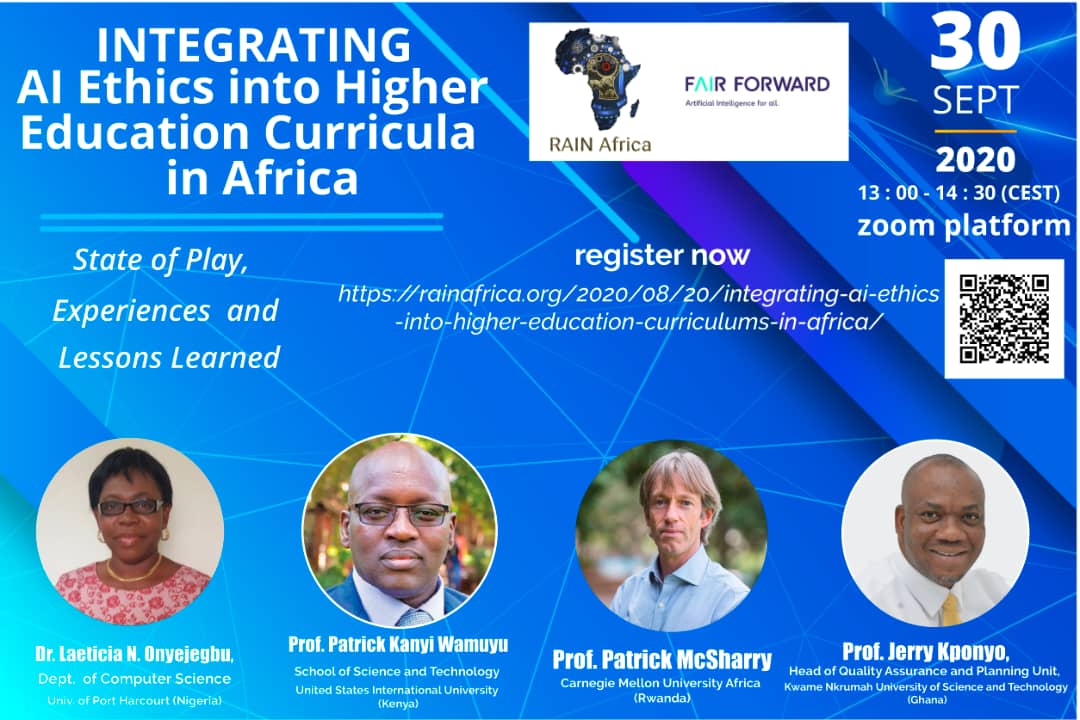
Integrating AI Ethics into Higher Education Curricula in Africa
Details
How is AI Ethics and Responsible AI currently being taught in Computer Science and Engineering Curriculums across Africa? What issues related to this topic are relevant to students and faculty? And what roadblocks or challenges are instructors facing to bring more discussion of AI ethics to classrooms?
The goal of this workshop is to foster a discussion on how to effectively integrate AI Ethics into Computer Science/Engineering programs at African Universities. This is an initial step to gather perspectives on the current situation at representative universities in different countries in Africa, and to initiate a discussion on how we can better support each other with lessons learned and share materials/curriculums to further develop AI ethics programs in higher education.
After identifying the current state, the interests of students and faculty and the needs of departments in this workshop session, the goal is to continue the series with more in-depth workshops on specific topics. We encourage all interested stakeholders (students, faculty, high education adminstration, or civil society members) to join in on the presentations and discussion. We will be hearing specifically from:
1. Dr. Laeticia N. Onyejegbu, Department of Computer Science – University of Port Harcourt (Nigeria). Onyejegbu Laeticia, earned her PhD degree in Computer Science from the University of Port Harcourt, Nigeria. During her tenure as the Head of Department of Computer Science of the University of Port-Harcourt, she organized workshops for both staff and students. She created one-on-one mentoring that witnessed improved performance of students in her department. She has peer-reviewed numerous papers in journals and international conference proceedings. She has also published books, and book chapters.
2. Prof. Patrick Kanyi Wamuyu, School of Science and Technology – United States International University (Kenya). Patrick Kanyi Wamuyu is the coordinator of the SIMElab Africa (Social Media Lab Africa), and an Associate Professor of Information Technology at United States International University-Africa, Nairobi, Kenya. Dr. Wamuyu earned his Ph.D. degree in Information Systems and Technology from the University of KwaZulu-Natal, Durban, South Africa. He completed his postdoc research at the Indian Institute of Information Technology, Allahabad, India, and the Freie Universität, Berlin, Germany.
3. Prof. Patrick McSharry, Carnegie Mellon University Africa (Rwanda). Patrick McSharry is a Professor at the Department of Electrical and Computer Engineering, Carnegie Mellon University, Research Fellow at the Kigali Collaborative Research Centre (KCRC) and Strategic Advisor to the World Bank funded African Centre of Excellence in Data Science (ACE-DS). Having served 22 years at Oxford University, he remains affiliated with the Oxford Man Institute of Quantitative Finance and the Oxford Internet Institute. He is a Fellow of the Royal Statistical Society, Senior Member of the IEEE and Senior Academic Member of the Willis Research Network and advises on working groups for insurance, open data and big data. Patrick was a Royal Academy of Engineering Research Fellow and held two Marie Curie Fellowships (UK and Spain)
4. Prof. Jerry Kponyo, Head of Quality Assurance and Planning Unit, Kwame Nkrumah University of Science and Technology (Ghana).Dr. Jerry John Kponyo is the head of Quality Assurance and Planning Unit and Senior Lecturer at the Department of Electrical/Electronic Engineering at Kwame Nkrumah University of Science and Technology (KNUST). His research focuses on applying intelligent systems and computer models in the area of wireless communication to solve real-life problems.
Sign up here: https://rainafrica.org/2020/08/20/integrating-ai-ethics-into-higher-education-curriculums-in-africa/
This event has been brought to you in collaboration with RAIN(Responsible AI Network) AFRICA (https://rainafrica.org/)

